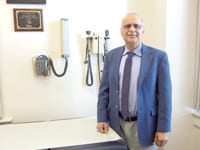Root Causes – Genetic Testing Holds Promise, but Proceed with Caution
Q: I’ve seen and heard a lot lately about genetic testing, especially on television. What is genetic testing, and what it is used for?
A: Genetic testing is the analysis of DNA from an individual (through a blood, saliva, or tissue sample). Genetic testing has the potential to offer valuable insights into your heritable information. Some genetic tests look for changes to the genetic material that have occurred due to a disease process like cancer. Biologic relationships, ancestry, medical diagnoses, and predisposition to disease are some examples of information that genetic testing can provide.
Q: What is direct-to-consumer genetic testing?
A: Direct-to-consumer, or DTC, genetic testing is a test that you as a consumer can order without a prescription or order from your physician or medical provider that involves analysis of your DNA. Often, the test requires a sample of saliva or spit, which contains cells with DNA. Paternity testing and ancestry testing are two examples of this.
Q: Why are we seeing so many ads lately for genetic-testing services to investigate your ‘roots’? How do these tests work?
A: Understanding more about ourselves and our health is interesting to everyone. There has been a recent explosion in the availability of DTC testing because consumers are interested and costs have come down. Although genetic testing is technically complicated, and the interpretation of the results is very complex, the price of the laboratory techniques necessary to look carefully at DNA has fallen dramatically in the last 15 years. The first time that the entirety of a human’s DNA was decoded, it cost over a billion dollars. Today, this type of analysis can be done for about $1,000. Therefore, analyzing small bits of human DNA is now relatively easy and inexpensive.
This is the type of testing that is used in most DTC testing. Although greater than 99{06cf2b9696b159f874511d23dbc893eb1ac83014175ed30550cfff22781411e5} of an individual’s DNA is exactly the same as everyone else in the world, we know that groups of people from different geographic areas have different variations in their DNA. ‘Ancestry’ tests look for these small differences in an individual’s genetic code and use these bits of data to speculate about the parts of the world that their genetic ancestors may have originated from.
Q: I’ve done a little research, and while some tests seem to focus on ancestry, other tests claim to provide health-related information, such as genetic health risks, wellness, or carrier status. What does this mean?
A: Some direct-to-consumer genetic tests offer health-related information, or reveal your ‘genetic risks.’ Understanding how small variations in our DNA affect our health remains very complicated, however. The currently available DTC health-related genetic test results typically look for genetic markers that may indicate a higher or lower risk for a trait that may be linked to health. Typically, these tests do not provide definitive information about health risks; rather, they give a probability or risk for developing a specific condition.
Lifestyle changes, such as eating a healthy diet, stopping smoking, and starting to exercise, are sometimes suggested based on your results. Certainly, a healthy lifestyle helps everyone regardless of their genetic background. Some genetic testing can look to see if you and your partner both carry a genetic trait(s) that could be passed on together to your child, with medical implications. Any genetic testing that has direct medical implications for you or your children should be undertaken with the involvement of a medical professional who has a good knowledge of genetics.
A medical geneticist or genetic counselor can help you decide whether or not a genetic test is appropriate for you, and assist in the interpretation of your results. It is important to take into account your medical and family history. Although medical genetics is the most rapidly changing field in medicine, there remain many more questions than answers about how genetics affects health.
Q: How are the tests ordered by a genetics doctor or genetic counselor different from direct-to-consumer tests?
A: Genetic testing ordered by healthcare providers knowledgeable about genetics is typically done to confirm a specific diagnosis, or to determine the risk that you (or your child) will develop a condition that may run in your family. These tests are done in certified laboratories, and the validity and significance of the results are carefully interpreted by specialists.
Q: What are the average costs of these tests I see advertised?
A: Direct-to-consumer tests typically cost about $100. Medical genetics tests range from hundreds to thousands of dollars. The difference in cost is related to the technical complexity of the test and the expertise required for the interpretation of the results. DTC testing is paid for by the consumer. Testing ordered by a medical provider is often, but not always, covered by health insurance. Some patients decide to pay for the testing on their own, to keep their results private.
Q: What about my privacy?
A: Consumers like yourself and patients should be careful to understand what will happen with their genetic data. Some DTC testing links your results with the results of others. Patients and consumers should be informed about who will have access to your test results, how those results will be protected, what happens to your sample after the testing is done, and what implications test results may have for you, your family members, even things like access to life or disability insurance.
Q: What do the experts think about all of this?
A: Genetic testing has many uses. As discussed above, it can generate really interesting (and entertaining) information about one’s genetic background. For some people, genetic testing can provide valuable medical information that will directly affect their medical diagnosis and treatment. So, proceed with caution, and seek advice from a professional genetics counselor.

